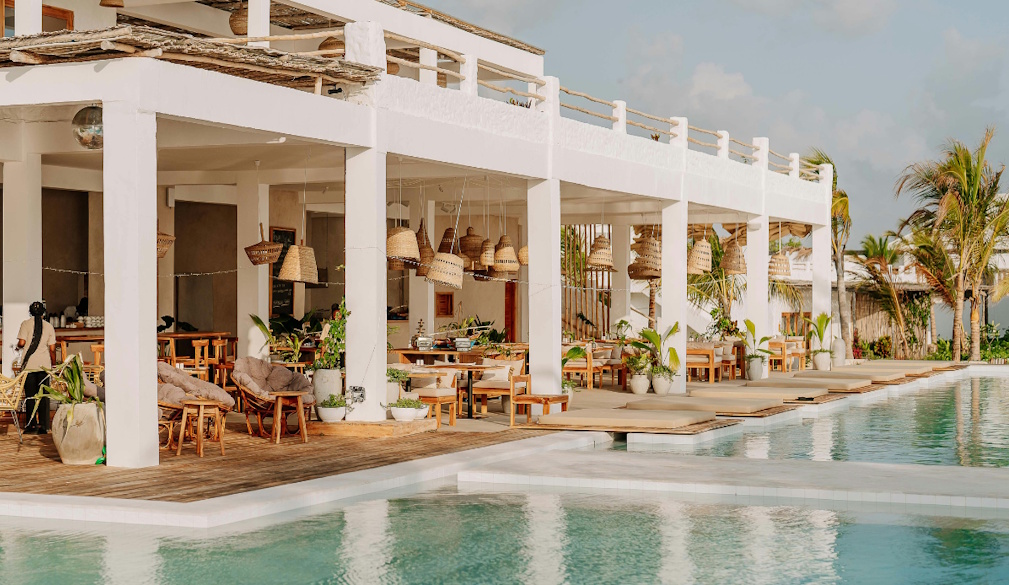Apéritif Restaurant: Leading Bali's Shift to a Luxury Destination

Bali, long celebrated as a lush paradise for adventurers and seekers of tranquility alike, is witnessing a transformative shift towards becoming a premier luxury destination, guided by the likes of Viceroy Bali and its distinguished Apéritif Restaurant. This evolution highlights the island's growing appeal to a more affluent demographic searching for unrivaled luxury and exclusive experiences. Apéritif Restaurant, nestled within the lavish confines of Viceroy Bali, epitomizes this shift, offering a unique culinary journey that captures the essence of Bali's rich heritage while embracing global gastronomic innovations. The emergence of these luxury landmarks reflects Bali's intricate balance of preserving its cultural integrity while embracing modern luxury, marking a significant chapter in the island's tourism narrative.
The article will delve into the various facets of Bali's transition into a luxury hotspot, from the pivotal role of Apéritif Restaurant and Viceroy Bali in this evolution to the broader implications for local communities and the economy. Readers can anticipate a comprehensive exploration of the factors driving Bali's luxurious metamorphosis, including the enhancement of local infrastructure, the elevation of service standards, and the strategic positioning of Bali on the world stage as a top-tier luxury travel destination. Further, the article will shed light on the impact of this shift on the local communities and economy, culminating in a discussion on what future luxury travelers to Bali can expect. This piece aims to provide a holistic understanding of the island's ambitious journey from a beloved backpacker's haven to a plush retreat for the world's elite.
The Evolution of Bali's Tourism
Historical Context
Bali's rich heritage, tracing back to the Stone Age, flourished during the Empire of the Majapahit from 1293 to 1520 AD, under the rule of Hayam Wuruk. This period marked a golden era, bringing Hindu-Javanese literature and artistic activities to Bali, forming the basis of its cultural arts today 7. Post the decline of the Majapahit Empire, an influx of Hindu priests, intellectuals, artists, and royal family members migrated to Bali, enriching its cultural tapestry 7. By the mid-19th century, under Dutch colonial expansion, Bali was integrated into the Dutch East Indies, setting the stage for its modern historical trajectory 7.
Initial Attraction for Budget Travelers
In the early 20th century, Bali's allure began to captivate the Western imagination. The establishment of the Bali Hotel in 1927 marked the island's first foray into catering to international visitors, hosting notable figures like Queen Elizabeth and Mahatma Gandhi 8. Despite the limited tourist influx initially, Bali's reputation as an exotic destination grew, especially highlighted by the Dutch to showcase its mystical temples and picturesque landscapes 8. By the 1970s, Bali had become a favored destination for young Western travelers, drawn by its authentic local experiences and the hospitality of its people, which significantly contributed to the global fame of Balinese warungs (local food stalls) 8.
Factors Driving the Shift Towards Luxury
Economic Growth
Indonesia's economic landscape is undergoing significant transformation, fueled by a burgeoning middle class with increased disposable income and a thirst for new experiences 21. This demographic shift is redefining the travel industry, with travel becoming more accessible and financially feasible for many Indonesians 21. The economic growth, marked by a robust 5% early economic growth rate and a stable 2% annual inflation rate, positions Indonesia among the anticipated top five strongest global economies by 2035 15. Bali, in particular, benefits from this economic upswing, with its real estate market boasting an average return on investment (ROI) of 13% and an 80% occupancy rate 15.
International Investments
In 2023, foreign direct investment in Bali reached approximately 808.5 million U.S. dollars, a significant increase from the previous year. This influx is partly due to the island's growing reputation as a stable and profitable investment destination, further supported by improvements in local infrastructure and technology that enhance connectivity and economic growth 17. The international demand for property in Bali has surged, with notable increases in investments from countries like Singapore, the United States, Australia, Malaysia, and Japan 18. Policies such as the Golden Visa have simplified the investment process, making Bali an even more attractive option for foreign investors 18.
Marketing and Branding
The luxury travel market is driven by high-net-worth individuals who demand unique and personalized experiences, valuing exclusivity and privacy 20. Effective marketing campaigns for this sector utilize sophisticated language and storytelling to connect with this discerning audience, emphasizing the uniqueness and authenticity of the travel experience 20. Bali's successful branding strategies have leveraged its cultural and natural beauty, creating a compelling image that resonates with luxury travelers seeking tranquility and adventure. The island's promotional efforts, highlighting its peaceful foreign policy and commitment to sustainability, have further solidified its status as a premier luxury destination.
Impact on Local Communities and Economy
Job Creation and Income
Tourism in Bali provides significant job opportunities, especially in rural areas where options are limited. The industry directly employs individuals as tour guides, hotel staff, and drivers, while indirectly creating demand for local products and services 28. This influx of tourists not only bolsters the local economy but also facilitates cultural exchange, enhancing appreciation for the Balinese way of life and preserving cultural heritage 28.
Cultural Impacts
The rapid growth of tourism, however, raises concerns about the preservation of Bali's unique cultural identity. As the island becomes a hub for international visitors, there is a risk of cultural dilution. Efforts are being made to incorporate local art, music, and architecture into luxury settings, which not only enriches the tourist experience but also promotes cultural appreciation and economic growth. Additionally, the focus on sustainable tourism initiatives aims to protect and celebrate Bali's rich cultural heritage while accommodating economic benefits.
Sustainability Challenges
Despite the economic advantages, the surge in tourism presents sustainability challenges. The construction of hotels and luxury residences has led to significant environmental impacts, including water shortages and increased waste production. In 2015, Bali faced a potential drinkable water crisis due to the high consumption rates of the tourism sector. Furthermore, the development often occurs at the expense of local communities, with land dispossession exacerbating income disparities and cultural uprooting. Sustainable tourism practices and real estate development that engage with local communities are crucial to mitigating these issues and ensuring that Bali retains its allure as a luxury destination.
What to Expect as a Luxury Traveler in Bali
Accommodation Options
Luxury travelers to Bali can expect a variety of high-end accommodations that cater to every preference. Renowned for its private pools, butler service, and stunning views, Bali offers properties like The Apurva Kempinski Bali and Capella Ubud Bali, which provide unique experiences ranging from coastal views to forest retreats. Viceroy Bali, another exceptional choice, combines luxury with cultural elegance, ensuring a memorable stay.
Dining Experiences
Bali is also a paradise for gourmet enthusiasts. Apéritif Restaurant stands out as a pinnacle of fine dining, offering a mix of local and international cuisines. Travelers can enjoy Mediterranean and Asian dishes at Soleil on The Mulia Bali or explore the local flavors at Locavore in Ubud. Each restaurant offers a unique dining experience with spectacular views, enhancing the culinary journey.
Exclusive Activities
For those seeking unique experiences, Bali provides an array of exclusive activities. Luxury travelers can embark on private boat tours, enjoy personalized spa treatments, or play golf on globally recognized courses. Additionally, exclusive access to cultural sites and remote beaches offers a blend of relaxation and adventure, tailored specifically for the discerning traveler.
Conclusion
Through the exploration of Bali's transformation into a luxury destination, it's clear that establishments like Viceroy Bali and Apéritif Restaurant significantly contribute to this evolution, merging the island's rich heritage with modern luxury. These landmarks not only underscore Bali's cultural and natural beauty but also showcase an advanced trajectory towards catering to affluent travelers. The journey from a serene paradise to a plush retreat underscores a broader trend of strategic positioning and infrastructural enhancement, with Viceroy Bali and Apéritif standing out as pivotal elements in this narrative, leading the island into a new era of luxury tourism.
The implications of Bali's shift towards high-end tourism are profound, impacting local communities, the economy, and the environmental landscape. Despite the luxury market's promise of exclusivity and unmatched experiences, the balance of economic benefits with sustainable practices and cultural preservation remains paramount. The evolving landscape of Bali, characterized by the allure of places like Viceroy Bali resort and the culinary marvels of Apéritif Restaurant, offers a glimpse into the future of luxury travel—where traditional charm and modern opulence coexist, setting a benchmark for destinations worldwide.













